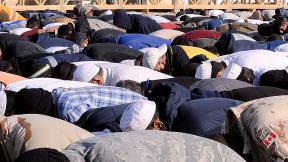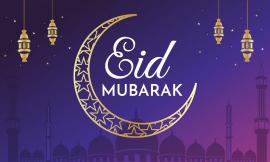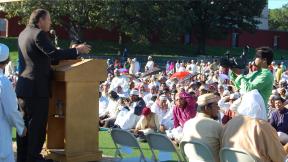
While in the US Eid-ul-Adha comes and goes without much notice, in some Muslim cultures, Eid-ul-Adha, is called Eid Kabeer or the bigger Eid, compared to Eid-ul-Fitr. Yet, the latter celebration gets more attention for many, perhaps because it follows a month of intense spiritual interaction through extra prayer and fasting, Ramadan. In contrast, Eid ul Adha springs up unexpectedly for many, and is then given less attention.
Eid-ul-Adha, in many ways is the bigger Eid. It is a three-day long celebration, four according to some, and commemorates the struggle of Prophet Abraham, peace be upon him, and his family.
The broader connection with this great Prophet is significant because he and his son Ismail were the first to re-establish the Kaba, the House devoted to the worship of One God, a pillar of monotheism. Prophet Muhammad, peace and blessings be upon him, reformed Hajj as a commemoration and commitment to Prophet Ibrahim’s struggle for faith in One God for humanity.
Eid-ul-Adha also reflects the unity of all who come together through Hajj, which is performed in the same Islamic month, Dhul Hijjah, as this holiday. Over the centuries, Muslim pilgrims have shared their thoughts and recollections about this incredible journey of a lifetime, which is also a pillar of Islam. But when it comes to explaining how Hajj reflects unity in diversity, perhaps few said it as beautifully as Malcolm X in his l964 letter from Mecca:
"There were tens of thousands of pilgrims, from all over the world. They were of all colors, from blue-eyed blondes to black-skinned Africans. But we were all participating in the same ritual, displaying a spirit of unity and brotherhood that my experiences in America had led me to believe never could exist between the white and the non-white.”
Today, living in a globalized culture, the significance of the kind of equality before God expressed through Hajj, as well as another symbol of Eid-ul-Adha, Prophet Abraham, cannot be underestimated. This Prophet is respected and honored by the three faiths that are described by their connection to him: the Abrahamic faiths of Judaism, Christianity, and Islam.
Finally, Eid-ul-Adha is a testament to freedom and liberty. Rose Wilder Lane’s book Discovery of Freedom, which is considered a seminal work in the American libertarian movement, makes that clear. In it, she described three sources of freedom: the legacy of Prophet Ibrahim, peace be upon him; the life of Prophet Muhammad, peace and blessings be upon him, and Islamic civilization, and the American Revolution. She emphasized that ideas propounding liberty built on those of the past, and that each was critical to the development of the subsequent one.
Her chapter on the Prophet Muhammad, peace and blessings be upon him, is nothing like a regular biography. Although she made some small factual errors, her overall argument that Islamic civilization advanced the cause of freedom is very powerful.
So this Eid-ul-Adha, as you enjoy food, family, and fun, please also consider the deeper messages of monotheism, the unity of humanity, freedom, and the great Prophets Abraham and Muhammad, God’s peace and blessings be upon them, reflected in this great holiday.
Photo Attribution: amrufm http://www.flickr.com/photos/amrufm/2169479508/








Add new comment